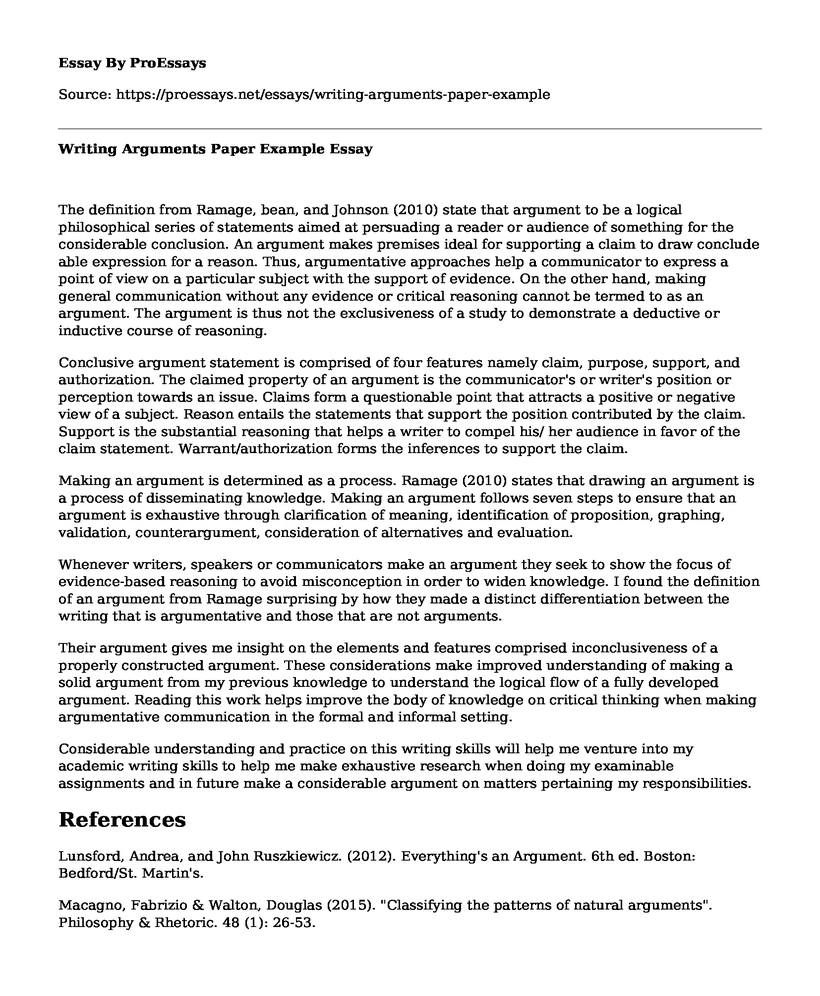The definition from Ramage, bean, and Johnson (2010) state that argument to be a logical philosophical series of statements aimed at persuading a reader or audience of something for the considerable conclusion. An argument makes premises ideal for supporting a claim to draw conclude able expression for a reason. Thus, argumentative approaches help a communicator to express a point of view on a particular subject with the support of evidence. On the other hand, making general communication without any evidence or critical reasoning cannot be termed to as an argument. The argument is thus not the exclusiveness of a study to demonstrate a deductive or inductive course of reasoning.
Conclusive argument statement is comprised of four features namely claim, purpose, support, and authorization. The claimed property of an argument is the communicator's or writer's position or perception towards an issue. Claims form a questionable point that attracts a positive or negative view of a subject. Reason entails the statements that support the position contributed by the claim. Support is the substantial reasoning that helps a writer to compel his/ her audience in favor of the claim statement. Warrant/authorization forms the inferences to support the claim.
Making an argument is determined as a process. Ramage (2010) states that drawing an argument is a process of disseminating knowledge. Making an argument follows seven steps to ensure that an argument is exhaustive through clarification of meaning, identification of proposition, graphing, validation, counterargument, consideration of alternatives and evaluation.
Whenever writers, speakers or communicators make an argument they seek to show the focus of evidence-based reasoning to avoid misconception in order to widen knowledge. I found the definition of an argument from Ramage surprising by how they made a distinct differentiation between the writing that is argumentative and those that are not arguments.
Their argument gives me insight on the elements and features comprised inconclusiveness of a properly constructed argument. These considerations make improved understanding of making a solid argument from my previous knowledge to understand the logical flow of a fully developed argument. Reading this work helps improve the body of knowledge on critical thinking when making argumentative communication in the formal and informal setting.
Considerable understanding and practice on this writing skills will help me venture into my academic writing skills to help me make exhaustive research when doing my examinable assignments and in future make a considerable argument on matters pertaining my responsibilities.
References
Lunsford, Andrea, and John Ruszkiewicz. (2012). Everything's an Argument. 6th ed. Boston: Bedford/St. Martin's.
Macagno, Fabrizio & Walton, Douglas (2015). "Classifying the patterns of natural arguments". Philosophy & Rhetoric. 48 (1): 26-53.
Ramage, John D., John C. Bean, and June Johnson. (2012). Writing Arguments: A Rhetoric with Readings (Concise 7th Edition). Boston: Pearson, ISBN: 13: 978-0-321-96428-1.
Cite this page
Writing Arguments Paper Example. (2022, May 26). Retrieved from https://proessays.net/essays/writing-arguments-paper-example
If you are the original author of this essay and no longer wish to have it published on the ProEssays website, please click below to request its removal:
- Anton Webern Passacaglia for Orchestra OP. 1 Analysis
- Origins of Auxiliary Do Paper Example
- Music Therapy Examination Paper Example
- Paper on Investigating China's Fashion & Beauty Wanghong Economy: Impact & Implications
- Essay Sample on Cultural Significance of Art in Florence
- Essay Example on My Own Private Idaho: Keanu Reeves' Journey for Identity
- Paper Sample on The Growth of Humans: Exploring Developmental Psychology







